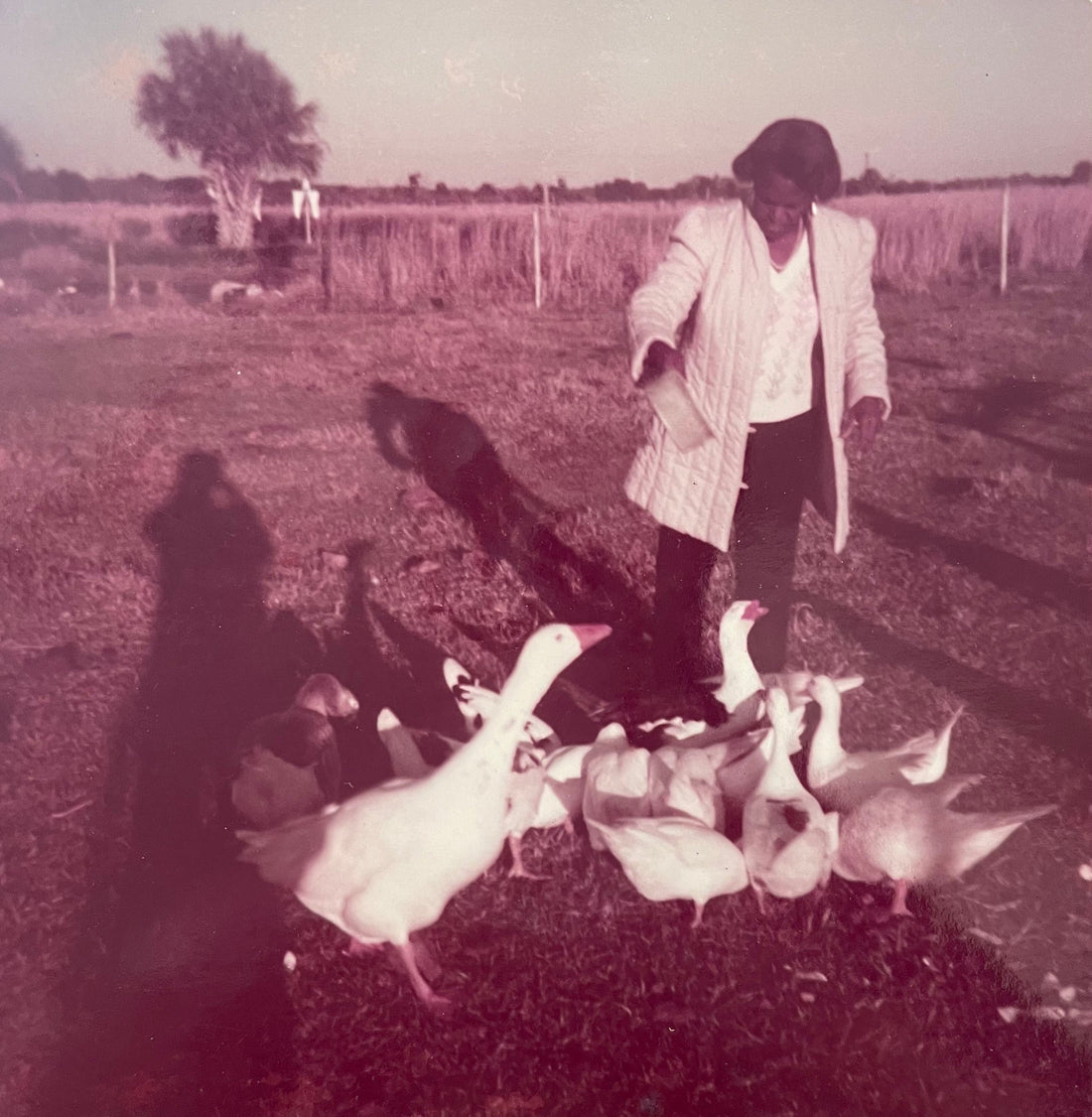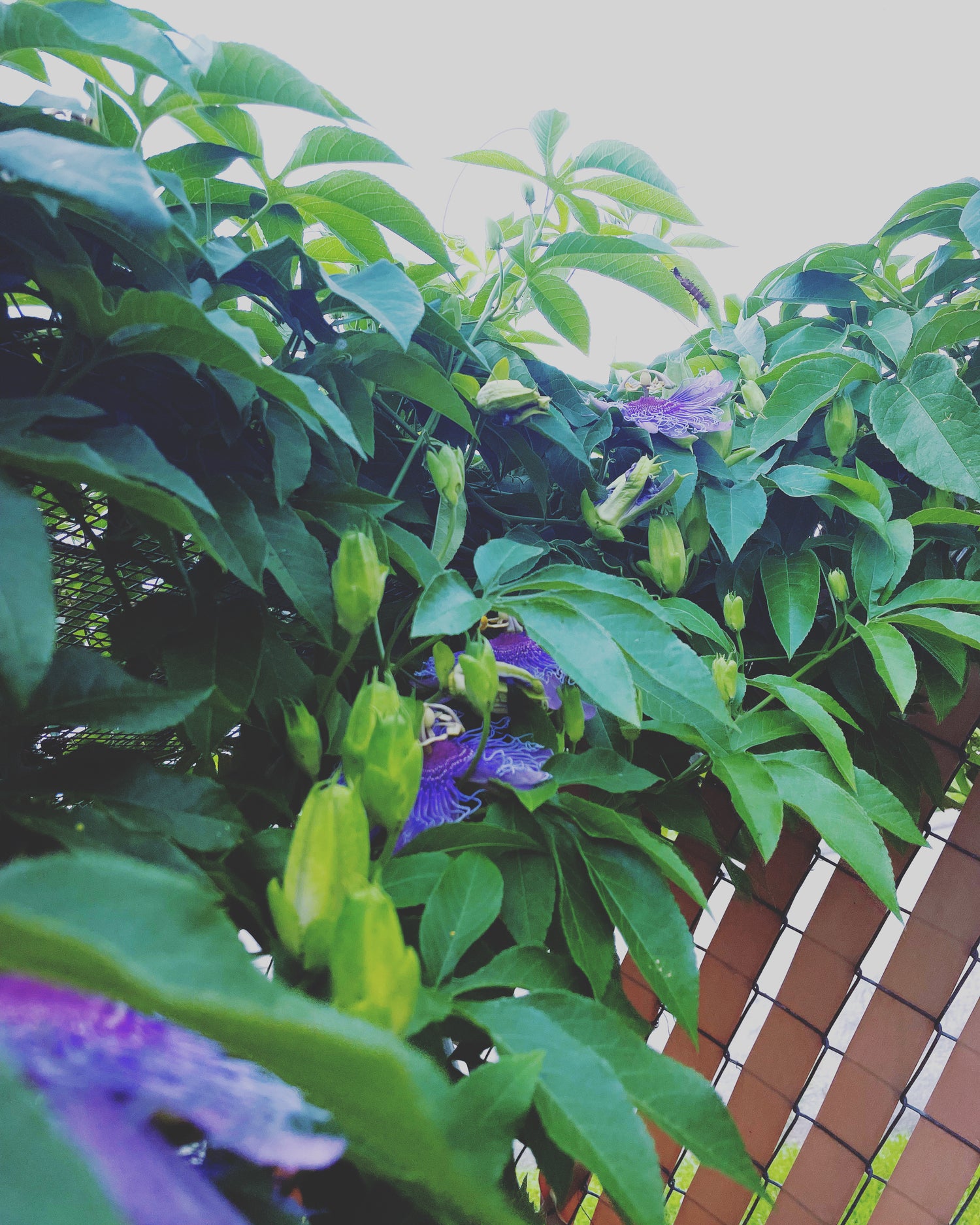The story behind Violet’s Herbs, and the quiet strength of the woman who planted its first seeds.

Our calling began in the hills of Jamaica, where a woman named Violet walked the land with quiet strength and faithful hands. She moved through the world with purpose. Gathering herbs, raising children, and offering care in the most practical, sacred ways.
Violet’s knowledge was passed through the spoken word, through island air and family tradition. She knew which leaves cooled fevers, which teas calmed a restless child, and how to turn whatever was growing into something that healed. In her yard, cerasee vines crept along the fence, fevergrass danced in the breeze, and mint leaves dried in the shade beside fresh-picked thyme.
She later married Henry Stephenson, a strong and resourceful Cuban man with stories of his own. Together they carried their roots, their language, their flavors, and their faith to New York, where the rhythm of the city met the pulse of the Caribbean spirit. She raised their children close to the soil and closer still to God.

In the small backyard of a Brooklyn home, Violet recreated her island garden. A sacred space where bush remedies grew between concrete and chain-link fences. She buried glass jars deep beneath the soil, letting her tinctures steep in patience and stillness. This quiet patch of earth, humming with basil and mint, became a place of healing for more than just her family.
Violet was not a loud woman, but she carried joy wherever she went. She had many friends, and my mother remembers being brought along to church gatherings, family functions, and neighborhood celebrations moments filled with food, laughter, and the comforting presence of women who knew how to take care of each other. Violet was respected and known for her kindness. She gave freely. Whether someone needed a prayer, a pot of bush tea, or a healing tincture, Violet showed up.
Her daughter, Althea Theresa, inherited that same devotion and brought it to a sprawling piece of land in Miami, where I was raised. That farm was a world of its own and to me, it was everything.

Althea ran a quail farm as her main livelihood, raising birds with care and purpose. But all around them, the land pulsed with life. Avocado trees shaded the walkways, plantain and guava ripened in the heat, and candlestick blooms blazed gold in the afternoon sun. An aviary of colorful birds filled the air with movement and sound, a kind of wild orchestra that never truly rested. Herbs grew wherever there was space, tucked along fence lines, clustered near banana trees, stretching towards the Florida sky.
It was there that I learned how to listen to the plants. How to regenerate the soil with care. How to grow with intention.

And today, Althea Theresa is still the backbone of the gardens we tend. She is the driving force behind so many of the herbs we grow and produce. Her hands remain in the soil, her wisdom in every harvest. She is the heartbeat of Violet’s Herbs and always will be.
And like the vines that reach for light, the story continues.

I am Zahra Violeta. Granddaughter of Violet, daughter of Althea, keeper of the garden’s next chapter. I was raised beneath guava trees and alongside the soft flutter of wings from our aviary, where the scent of fresh herbs mixed with the quiet teachings of my mother’s hands. I learned the language of plants the way most children learn lullabies.

This Is the Work That Saved Me
I grew my joy by hand.
I moved to New Orleans when I was just eighteen, young, eager, and already aching to shape a life of my own. For a time, I stayed with my father, a businessman who ran a barge transportation and equipment repair company called Chibbco Enterprises. His world moved with precision and industry, but I never quite found my place in it. I tried to work for the company, but no one seemed interested in teaching me. I felt like I was there to keep busy, not to grow. Maybe they thought the work was too rough for a girl. Maybe they didn’t see what I had to offer. I felt like a feral cat, wandering, misfit, present but never fully belonging.
Eventually, I moved out and got my own apartment. I worked two jobs, sometimes three, just to stay afloat. I was determined to build something of my own. And then I met Darren. We were friends for a time, and it was magical. Until I had my first born son, and then two more children followed. He’s my husband now, and like many stories worth telling, ours hasn’t been easy. It wasn’t easy then, and twelve years later, it still isn’t. We’ve struggled, we’ve grown, we’ve disagreed. Especially when it came to my decision to leave the traditional workforce.
Darren never really understood why I didn’t want to go back to working for the man. But I knew, I knew in my bones, that the path of entrepreneurship was the only way I could stay close to my children. I couldn’t leave them in someone else’s care just to clock into a job that drained me. I couldn’t miss their firsts, their questions, their soft little voices calling for me.
That choice, to stay and raise my children with my own two hands, drew an invisible line between Darren and me. A quiet wedge that grew deeper over time.
To him, stability looked like a full-time job and kids in daycare. That was what he knew. That was how he was raised. But I was raised in a different world. A softer world. My mother raised me from home, on a small farm in Miami, where everything smelled of earth, citrus, and the sweetness of ripening things. I remember running barefoot through the garden rows, hands stained green from picking callaloo and basil, sunlight slipping between banana leaves. My mother never rushed. Her days were full, but never frantic. She taught me how to live close to the land and even closer to my family. That was the happiest time of my entire life.
So when I became a mother, I didn’t want to hand off those early years to a stranger or trade my time for someone else’s clock. I wanted my children to have what I had. Warm mornings. Home-cooked meals. The comfort of knowing their mother was always near. I wanted to be the one who taught them how to walk, how to wonder, how to pray, how to plant.
But in choosing that, I was also choosing distance from the man I loved. Darren couldn’t understand why I wouldn’t just do what most women do. Why I didn’t put the babies in daycare and “go get a real job.” He thought I was stubborn, even reckless. But the truth was, I was doing what I believed in. What I knew was right. And I carried that belief alone, for a long time.
We were raised in different worlds, and that difference echoed in everything. How we saw time. How we saw success. How we saw the role of a mother. I didn’t want to be a visitor in my children’s lives. I wanted to be their foundation.
It’s still not easy. But I never regretted choosing them.

So I studied. I checked out stacks of books from the library, listened to audiobooks while washing dishes, took online courses, signed up for classes. I studied like my future depended on it, because it did.
Being a business owner wasn’t just a dream. It was my way of staying home. It was my way of showing up for my kids while building something they could inherit. My children are my heartbeat, my joy, my reason. I want my daughter to grow up knowing that she can have both a family and a dream. That she can bring her babies to work if she wants to. That she’ll never have to choose between being a present mother and being a leader.
I’ve opened a few businesses over the years, some out of passion, some out of necessity. I taught myself graphic design. I sold food, I did hair. I opened a baby clothing store. I was proud of every effort, but if I’m honest, none of it truly felt like mine. None of it rooted me in purpose.
That changed the day I saw a commercial for the Chestnut School of Herbal Medicine. Juliet Blankespoor’s voice, her connection to the land, her reverence for plants, it stirred something deep in me. A remembering. A quiet echo of my heritage. Of the life my mother gave me. Of warm soil and healing hands in our garden back in Miami, Florida.
I remembered a time when I was so happy.
Right then, I knew I had found my path.
I enrolled in the Chestnut School and began learning with my whole heart. I studied the American herbalism way to grow, harvest, and prepare herbs from the ground up. I learned to infuse plants with patience and intention. It was more than education. It felt fun, sacred, and fruitful. It felt like something that could stretch across generations because it was the continuation of Violets, and what my mother taught me. It was something I could teach my children, just like the plants themselves, resilient, regenerative, always giving more than they take. It was a way of life.

I live close to the soil because the world beyond it never felt like mine.
I didn’t want the clock-in life. I didn’t want to trade my children for a paycheck, or rush my joy in service of someone else’s dream. I’ve never been drawn to the noise of commercial life. That industrial nine-to-five world.
It tries to take my time, my babies, my relationships, my peace. I said no.
I wanted a different rhythm
A rhythm where the sun tells time, not a clock,
where morning begins with barefoot walks through dew-soaked herbs,
and evenings end with the scent of chamomile on my fingertips.
Violet’s Herbs is the result of that rhythm. A return to the handmade, the earth-born, the old ways.
I am my mother’s hands. I am my grandmother’s garden.
I am quiet by nature, but my vision is loud. It lives in my hands, in my home, and in every offering I create. I am building Violet’s Herbs not just for today, but for the future. A gift to pass down.

My daughter, Rosemary Violeta, she carries the name, and with it, the story. She gathers flowers with quiet purpose and already speaks the language of the land. I see my grandmother in her. And I teach my children, just as I was taught. Not just about herbs, but about life. About wellness. About the divine connection between all living beings.

A continuation of love shaped by calloused hands, watered by faith, and passed down through generations. What began in the hush of island soil now blossoms in Southern heat, tended by a women who remember.
This article is for educational purposes only and is not intended as medical advice. The information shared reflects traditional, historical, and cultural uses of herbs. These statements have not been evaluated by the Food and Drug Administration. Our products and content are not intended to diagnose, treat, cure, or prevent any disease. Always consult with a qualified healthcare professional before using herbal products, especially if you are pregnant, nursing, taking medications, or have a medical condition.


